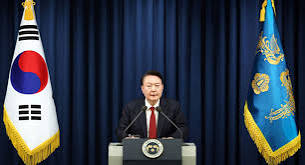South Korea’s Constitutional Court has ruled unanimously to remove President Yoon Suk Yeol from office, following his controversial martial law declaration, which sparked widespread political unrest. The court’s decision comes after Yoon’s attempt in December 2023 to undermine civilian governance, which saw armed troops deployed to parliament to prevent lawmakers from opposing his decree.
Yoon, 64, had already been suspended by lawmakers due to his actions, which included a failed attempt to suppress opposition voices through military intervention. The court’s ruling on Friday marked a significant chapter in the country’s political history, triggering new elections that must be held within 60 days. The election date will be confirmed in the coming days.
The ruling was met with mixed reactions across South Korea, with public outrage from Yoon’s supporters. Outside the court, some of them were seen threatening the judges, necessitating extra police security. However, the court’s decision was hailed by opposition lawmakers, who celebrated it as a historic moment for South Korean democracy.
“The actions of President Yoon violated the core principles of the rule of law and democratic governance,” said Acting Court President Moon Hyung-bae in his ruling. The court emphasized that the deployment of armed soldiers for political reasons represented a clear breach of the military’s political neutrality and amounted to a betrayal of public trust.
Yoon had previously defended his actions, arguing that his declaration of martial law was necessary to tackle “anti-state forces.” Despite this, the Constitutional Court found his conduct to be unconstitutional, resulting in the second impeachment of a South Korean president after Park Geun-hye’s removal in 2017.
Security measures were heightened around the courthouse, as both anti-Yoon protesters and supporters gathered to witness the outcome. While anti-Yoon demonstrators celebrated, some Yoon supporters expressed grief and anger, even resorting to drastic actions. In a tragic twist, at least two of Yoon’s staunch supporters reportedly died by self-immolation earlier this year in protest against the impeachment.
Despite the challenges to South Korea’s democracy, experts noted the resilience of the country’s political system. “The system has withstood even the most severe challenge — an attempt to undermine civilian rule — and proved that South Korea’s democracy can endure,” said Byunghwan Son, a professor at George Mason University.
With the court’s decision, portraits of President Yoon will be removed from military offices, in line with defence ministry regulations, which require the commander-in-chief’s image to be displayed in military institutions.
Following the court’s decision, South Korea’s economy saw a positive response, with the Korean won strengthening against the US dollar, and the country’s benchmark stock index, KOSPI, rising by 0.35%. This comes as South Korea continues to navigate through various crises, including a devastating wildfire season and trade challenges.
Yoon, who still faces a separate criminal trial on charges related to insurrection, remains a polarizing figure in South Korea. Acting President Han Duck-soo will remain in office until the new elections are held.
In the wake of the ruling, National Assembly Speaker Woo Won-shik emphasized that the decision affirmed the principle that no individual, including the president, is above the law. “Any power that commits unconstitutional or illegal acts must be held accountable,” Woo stated, reinforcing South Korea’s commitment to democratic principles.
The decision also serves as a reminder of the country’s enduring commitment to the rule of law, with Yoon’s removal marking a pivotal moment in South Korea’s political landscape.
